
Hỏa Lò Prison was a prison in Hanoi originally used by the French colonists in Indochina for political prisoners, and later by North Vietnam for U.S. prisoners of war during the Vietnam War. During this later period, it was known to American POWs as the "Hanoi Hilton". Following Operation Homecoming, the prison was used to incarcerate Vietnamese dissidents and other political prisoners, including the poet Nguyễn Chí Thiện. The prison was demolished during the 1990s, although its gatehouse remains a museum.

The Battle of Đồng Xoài was a major battle fought during the Vietnam War as part of the Viet Cong (VC) Summer Offensive of 1965. It took place in Phước Long Province, South Vietnam, between June 9 and 13, 1965.
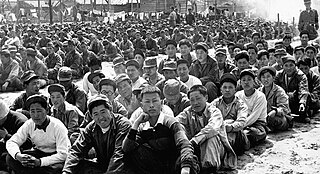
A prisoner-of-war camp is a site for the containment of enemy fighters captured as prisoners of war by a belligerent power in time of war.
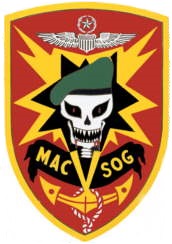
Military Assistance Command, Vietnam – Studies and Observations Group (MACV-SOG) was a highly classified, multi-service United States special operations unit which conducted covert unconventional warfare operations before and during the Vietnam War.

Conflict: Vietnam is a tactical shooter video game developed by Pivotal Games and published by Global Star Software and SCi Games for PlayStation 2, Xbox, and Windows. Released in 2004, it is the third installment in the Conflict series. A separate version was developed by 8bit Games and published by Synergenix for mobile devices the same year. A port for Gizmondo devices was planned before being cancelled.

George Thomas Coker is a retired United States Navy commander who was awarded the Navy Cross for extraordinary heroism as a prisoner of war (POW) during the Vietnam War. An Eagle Scout, he is noted for his devotion to Scouting.

Robert Russell Garwood is a former United States Marine. Often cited as the last verified American prisoner of war (POW) from the Vietnam War, Garwood was captured on September 28, 1965 by Việt Cộng forces near Da Nang, Quang Nam Province. He was taken to North Vietnam in 1969, and although he was reportedly released in 1973 along with the other U.S. POWs as part of the Paris Peace Accords, he did not return to the United States until March 22, 1979.

The Battle of Ba Gia was a major battle that marked the beginning of the Viet Cong's (VC) Summer Offensive of 1965, during the early phases of the Vietnam War. The battle took place in Quảng Ngãi Province, South Vietnam, between May 28–31, 1965.
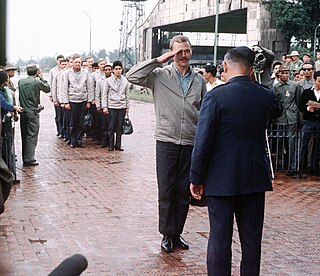
Operation Homecoming was the return of 591 American prisoners of war (POWs) held by North Vietnam following the Paris Peace Accords that ended U.S. involvement in the Vietnam War.
The Senate Select Committee on POW/MIA Affairs was a special committee convened by the United States Senate during the George H. W. Bush administration to investigate the Vietnam War POW/MIA issue, that is, the fate of United States service personnel listed as missing in action during the Vietnam War. The committee was in existence from August 2, 1991 to January 2, 1993.

The Pleiku campaign took place from 23 October to 26 November 1965. II Corps Command named it Pleime campaign, with a slightly different starting date of 20 October instead of 23 October, consisted of three operations:

The Vietnam War POW/MIA issue concerns the fate of United States servicemen who were reported as missing in action (MIA) during the Vietnam War and associated theaters of operation in Southeast Asia.

At the start of 1971 South Vietnamese troops continued operations against the North Vietnamese People's Army of Vietnam (PAVN) and Vietcong (VC) base areas in eastern Cambodia. The ill-conceived and poorly executed Operation Lam Son 719 against PAVN supply lines in eastern Laos showed the weaknesses within the South Vietnamese military command and the limited ability of South Vietnam's armed forces to conduct large-scale combined arms operations. The U.S. continued its unilateral withdrawal from South Vietnam despite the lack of any progress in the Paris Peace Talks and by November U.S. forces had ceased offensive operations. The U.S. withdrawal and antiwar sentiment within the military led to an ongoing decline in morale and discipline within the U.S. forces and growing drug use, particularly of heroin. As U.S. combat units withdrew, security in their former operational areas deteriorated and the PAVN/VC began a series of attacks on ARVN positions in Quảng Trị province and the Central Highlands. In Cambodia the Cambodian government continued to lose ground to the PAVN despite extensive U.S. air support and training and periodic attacks into Cambodia by the ARVN. While the bombing of North Vietnam had ceased in November 1968, U.S. aircraft continued to conduct reconnaissance flights over the North and responded to radar-tracking and antiaircraft fire with "protective reaction" strikes which numbered more than 100 by the year-end and culminated in a five-day bombing campaign in late December.

1972 in the Vietnam War saw foreign involvement in South Vietnam slowly declining. Three allies, Australia, New Zealand and Thailand, which had each contributed military contingents, left South Vietnam this year. The United States continued to participate in combat, primarily with air power to assist the South Vietnamese, while negotiators in Paris tried to hammer out a peace agreement and withdrawal strategy for the United States.

1973 in the Vietnam War began with a peace agreement, the Paris Peace Accords, signed by the United States and South Vietnam on one side of the Vietnam War and communist North Vietnam and the insurgent Viet Cong on the other. Although honored in some respects, the peace agreement was violated by both North and South Vietnam as the struggle for power and control of territory in South Vietnam continued. North Vietnam released all American prisoners of war and the United States completed its military withdrawal from South Vietnam.
Members of the United States armed forces were held as prisoners of war (POWs) in significant numbers during the Vietnam War from 1964 to 1973. Unlike U.S. service members captured in World War II and the Korean War, who were mostly enlisted troops, the overwhelming majority of Vietnam-era POWs were officers, most of them Navy, Air Force, and Marine Corps airmen; a relatively small number of Army enlisted personnel were also captured, as well as one enlisted Navy seaman, Petty Officer Doug Hegdahl, who fell overboard from a naval vessel. Most U.S. prisoners were captured and held in North Vietnam by the People's Army of Vietnam (PAVN); a much smaller number were captured in the south and held by the Việt Cộng (VC). A handful of U.S. civilians were also held captive during the war.
The Commando Raiders or Commando Raider Teams (CRTs) were a Laotian paramilitary commando unit, which operated closely with the U.S. Central Intelligence Agency (CIA) during the final phase of the Laotian Civil War, from 1968 to 1973.
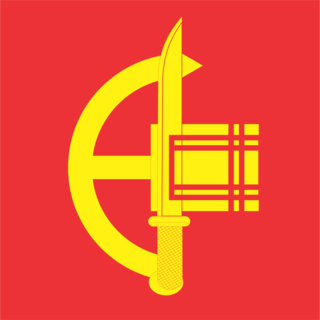
The People's Army of Vietnam Special Forces Arms, officially the Special Operation Force Arms or Special Operation Arms, is the elite combat armed service of the People's Army of Vietnam, led by the General Staff of the Vietnam People's Army. It is uniquely organized, equipped, and trained with special fighting skills, bravery and heroism, resourcefulness and boldness to attack and destroy key enemy's targets.
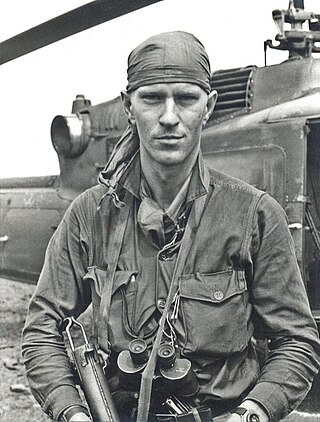
Jerry Michael Tate Shriver, also known by his nickname "Mad Dog", was a master sergeant in the United States Army who served in Military Assistance Command, Vietnam – Studies and Observations Group (MACV-SOG) in the Vietnam War. He took part in operations along the Ho Chi Minh trail, Cambodia and Laos from 1966 to 1969. He also served in West Germany as part of a long range patrol unit and in Taiwan. He took part in classified special operations missions in North and South Vietnam, Cambodia and Laos, often leading a platoon of Montagnard soldiers in his operations and conducting reconnaissance tasks.

Dissenting POWs: From Vietnam's Hoa Lo Prison to America Today is a 2021 non-fiction book by Tom Wilber and Jerry Lembcke, published by Monthly Review Press. The book is about the American POWs who dissented from the Vietnam War and whose story contradicted the official American POW narrative. Wilber and Lembcke argue all previous books on the POWs have given little attention to those POWs who dissented, and that this full history has been consciously obscured. They further suggest that this work can provide a place where future GIs and civilian resisters can look for role models and allies "in their efforts to end U.S. wars of aggression."

















